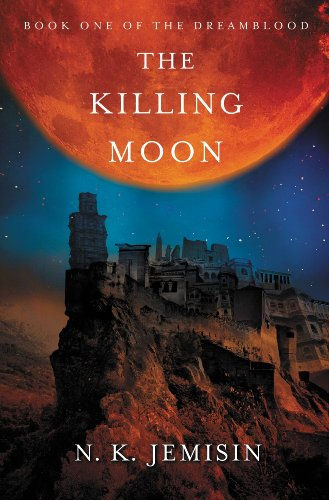Review: "The Killing Moon" by N. K. Jemisin
- Claire Quarterman

- Apr 19, 2023
- 2 min read
Updated: May 10, 2023

Quick Summary
Type: Novel, Book 1 in duology "The Dreamblood"
Genre: Fiction, fantasy, thriller
Blurb: "Assassin priests, mad kings, and the goddess of death collide in the first book of the Dreamblood Duology by NYT bestselling and three time Hugo-Award winning author N. K. Jemisin." Read Time: 4 days
Rating: 4 stars
Review
Overall, I found this to be an excellent, compelling story. It's the first in a duology, but it stands extremely well on its own. It primarily follows three characters, the Gatherer Ehiru, the Gatherer-Apprentice Nijiri, and the Ambassador Sunandi Jeh Karawe, though it occasionally follows other points of view when it serves the story. I found that this served the narrative quite well.
I also found the motivations of the different characters very interesting. There are clear "good guys" and clear "bad guys" but they all sincerely believe they are serving the greater good and striving for peace, even if their methods are questionable. I love a morally gray character, and in The Killing Moon, even the characters whose morals are closest to pitch black still have shades of gray.
There were a few things I didn't particularly enjoy. I'm not one to enjoy a ton of references to sex, especially if I don't feel like it adds a lot to the story. For example, early in the story Nijiri is interrogated by the Superior and other Gatherers about a Teacher that groomed him. However, this isn't really brought up again. I can only remember it being referenced once very late in the book, and that's it. Another example is Sunandi's quick hook-up with the Prince. Granted, that gave her an excuse to snoop around his rooms, but given the incident is also only referred to once again late in the novel, I don't wonder if that could have been avoided. After all, why does one of the few strong women in the novel need to be 'seduced'?
It also bothers me that a fantasy society with a matriarchal religion is still portrayed as subtly misogynistic. Yes, because they worship the dream goddess Hananja, they also worship their women. But worshipping a woman while limiting her opportunities to be her own person is still a bit sexist. In Gujaareh, it seems that women can either be wives, servants (and often also wives), regular prostitutes, or dream "prostitutes".
Finally, the Kindle version had a few errors that did take me out of the story. For example, at one point a character named Charris is referred to as Niyes, and the Hananja is misspelled.
Despite my issues with the book, I thought the story was interesting enough to keep me reading to the end. I wanted to read how it ended. And although I had a vague idea of what would happen, I didn't know how it would happen and I had my doubts about whether it would happen.
Overall, a very good book and I'm looking forward to reading the second book.











Comments